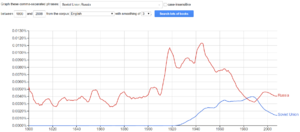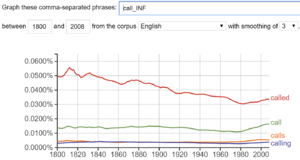Course:COGS200/2017W1/NGramAssignment/KevinLi
Compare words
Since the instant messaging platform MSN launched in 1995, its usage has been steadily going up until 2004 when Facebook launched. The introduction of Facebook into this system also created an attractor basin that's been lowering the state space of the collective variable "MSN". This corpus only goes up to the year 2008, which is quite a while ago in terms of social media proliferation. If these two variables continue to change at the same rate, they would probably cross each other approximately 4 years after the most recent date on the corpus.
The Soviet Union existed from 1922 to 1991, while Russia has always been in existence since way earlier. However, in the period of the Soviet Union's existence, the state of the collective variable "Russia" has been steadily lowered because Russia was politically a part of the Soviet Union at that time. At around 1983, "Soviet Union" finally exceeded the state space of "Russia", and at 1991 when the Soviet Union dissolved, the usage trends of the terms started to reverse.
Wildcard search
This graph shows the usage of following phrases, listed in order of popularity:
- it is healthy to have
- it is healthy to be
- it is healthy to do
- it is healthy to get
- it is healthy to eat
- it is healthy to live
- it is healthy to express
- it is healthy to keep
- it is healthy to drink
- it is healthy to recognize
These phrases can be seen as collective variables that describe the way people perceive health. From the large fluctuations in the states of these variables, it seems that people have had varying ideas as to what can make someone healthy. The overall most used variable here is "it is healthy to have", which seems to be the attractor here because "to have" is a fairly general verb that can encompass more than meaning "to possess". For example, people may use "it is healthy to have a good diet" instead of "it is healthy to eat well", which means the same thing but uses a different verb.
Inflection search
The word "call" has many meanings, and is mostly used as a verb and also a noun. Since the 1800's, all inflections of the word has been in a slowly declining state until around 1980, where all inflections of "call" started seeing increased usage. This is also around the time shortly after cellular phones were invented, and more and more people are starting to use cellphones.
Search for a word using Part-of-Speech tags
It is interesting here to see all the different parts of speech that “Google” can represent. While Google is generally thought of as a noun that refers to the big tech company, it actually tuns out that it's used more as an adjective to describe the products and services that Google makes. For example, "Google News", "Google Images", "Google Earth" are all instances where "Google" is considered an adjective here.
Search for Parts of Speech (not a specific word)
I chose to look for trends in the usage rates of adjectives. We can see here that most adjectives have relatively stable states through the years. One adjective that stands out from the rest is "great", which has dropped from second place to last place on this list since 1800. This might be because "great" is an adjective that can describe many things about a noun, and people have started to replace it with more specific adjectives to describe what "great" would have described. For example, instead of "a great crowd", people tend to use "a big crowd" more commonly now, and instead of "a great height", people might like to use to use "a tall height".





